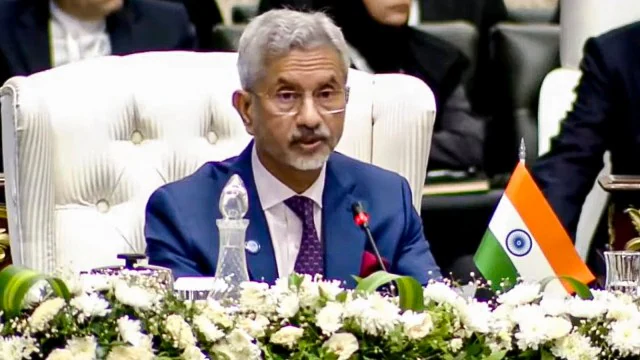S Jaishankar at SCO: A Call for Mutual Respect, Cooperation, and Sovereign Equality
On October 16, 2024, India’s External Affairs Minister S Jaishankar delivered a powerful speech at the 23rd Shanghai Cooperation Organisation (SCO) meeting held in Islamabad, Pakistan. His remarks were significant not just because of the timing and location, but because of the sharp message they carried. With Pakistan’s Prime Minister Shehbaz Sharif and China’s Premier Li Qiang in attendance, Jaishankar laid out India’s concerns regarding regional stability, cooperation, and respect for sovereignty.
In his speech, Jaishankar addressed several pressing issues, including terrorism, territorial disputes, and economic development. He spoke with a clear emphasis on the need for cooperation among SCO members, but on the condition that this cooperation must be built on mutual respect and equality. His words resonated not just with the audience in the room but also with nations across the region, making this a key moment in international diplomacy for India.
This blog breaks down Jaishankar’s speech into key themes, making it easier to understand and digest. We’ll cover his main points about the importance of trust and cooperation, the global challenges facing the region, India’s concerns with China and Pakistan, and his vision for the future of the SCO. Let’s dive in.
The Importance of Trust and Cooperation
The SCO was created to promote peace, security, and economic development in the region, which includes countries like China, Pakistan, Russia, India, and several Central Asian nations. Jaishankar began his speech by stressing how crucial trust and cooperation are for the success of this organization. Without these key ingredients, the goals of the SCO will be difficult to achieve.
He said, “If trust is lacking or cooperation inadequate, if friendship has fallen short and good neighborliness is missing somewhere, there are surely reasons to introspect and causes to address.”
This statement subtly referred to the strained relations between India and two of its neighbors: China and Pakistan. India has long faced challenges related to terrorism, border disputes, and a lack of cooperation on regional trade and connectivity projects with these countries. Jaishankar’s message was clear—without mutual trust and cooperation, the goals of the SCO would remain just aspirations.
Global Challenges Affecting the Region
Jaishankar then shifted his focus to the broader global context. The world is going through a difficult time, with multiple challenges affecting the region and the world at large. Two major conflicts are ongoing, and their repercussions are being felt globally. The COVID-19 pandemic has left many developing nations struggling to recover, while climate change, supply chain disruptions, and financial instability are making it harder for countries to grow and develop.
In his speech, Jaishankar highlighted these challenges and their impact on the region:
- Global Conflicts: The world is witnessing conflicts that have far-reaching consequences. These conflicts disrupt peace, create humanitarian crises, and strain economies across the globe.
- COVID-19 Pandemic: The pandemic has devastated many countries, especially in the developing world. It has widened the gap between rich and poor nations and slowed down global economic recovery.
- Climate Change: Extreme weather events, such as floods, droughts, and hurricanes, are becoming more frequent and severe. This impacts livelihoods, agriculture, and overall economic stability.
- Supply Chain Disruptions: Global trade has been affected by uncertainties in supply chains, which have caused delays and increased costs for many industries.
- Financial Volatility: Many countries, especially in the developing world, are facing rising debt levels and financial instability. This makes it difficult for them to achieve their development goals.
Jaishankar argued that these challenges require collective action from SCO members. The solutions, he said, can be found in the SCO Charter, which promotes mutual trust, friendship, and cooperation.
Table: Global Challenges Affecting SCO Members
| Challenge | Impact on SCO Members |
|---|---|
| Global Conflicts | Disrupts peace, causes humanitarian crises and economic strain. |
| COVID-19 Pandemic | Widened economic inequality and slowed recovery in developing nations. |
| Climate Change | Extreme weather events affect agriculture, economy, and livelihoods. |
| Supply Chain Disruptions | Increased costs and delays in trade and industry. |
| Financial Volatility | Rising debt and economic instability in developing nations. |
India’s Concerns with China and Pakistan
A major focus of Jaishankar’s speech was India’s ongoing concerns with China and Pakistan. One of the most contentious issues between India and China is the China-Pakistan Economic Corridor (CPEC). India has consistently opposed this project, as it passes through Gilgit-Baltistan, a territory that India claims as its own. Jaishankar made it clear that cooperation between countries must respect territorial integrity and sovereignty.
He stated, “Cooperation must be based on mutual respect and sovereign equality. It should recognize territorial integrity and sovereignty. It must be built on genuine partnerships, not unilateral agendas.”
This was a direct reference to India’s opposition to the CPEC and Pakistan’s refusal to grant India overland transit rights to Central Asia, which hinders regional trade and connectivity. For years, India has been pushing for better connectivity with Central Asia, but Pakistan has refused to allow Indian goods to pass through its territory, which has been a significant roadblock for regional cooperation.
The ‘Three Evils’: Terrorism, Separatism, and Extremism
Another key issue that Jaishankar addressed was the fight against terrorism, separatism, and extremism—what the SCO refers to as the “three evils.” These issues have long plagued the South Asian region, and India, in particular, has been a victim of cross-border terrorism. Jaishankar emphasized that without addressing these challenges, it would be difficult for the region to achieve true peace and stability.
He pointed out that terrorism, extremism, and separatism not only create security challenges but also hinder economic growth. They disrupt trade, prevent the free flow of energy, and block people-to-people exchanges. Jaishankar’s remarks were aimed at Pakistan, which India has accused of supporting terrorist groups that operate across its borders.
Jaishankar warned, “If activities across borders are characterized by terrorism, extremism, and separatism, they are hardly likely to encourage trade, energy flows, connectivity, and people-to-people exchanges in parallel.”
A Vision for Regional Cooperation
Despite these challenges, Jaishankar presented a vision of what could be achieved through genuine regional cooperation. He spoke about the immense potential for growth and development in areas like industrial collaboration, MSME (Micro, Small, and Medium Enterprises) cooperation, and enhanced connectivity. He argued that these efforts could lead to job creation, increased investment, and economic growth.
Jaishankar also highlighted how collaborative efforts in logistics and energy could transform the region. Improved connectivity could lower costs, increase efficiency, and create new economic opportunities. Additionally, joint efforts in environmental protection and healthcare could benefit all member states. For example, India’s pharmaceutical industry could help the region combat infectious diseases by providing affordable medicines.
He said, “Whether it is health, food, or energy security, we are all clearly better off working together. Indeed, even culture, education, and sports are promising areas. In effect, there is so much that we can do once we are truly determined to promote that synergy.”
India’s Global Initiatives
Jaishankar also used the platform to showcase India’s global initiatives that align with the SCO’s objectives. He highlighted several programs that India is leading, which can serve as examples for other countries in the region. These initiatives include:
- International Solar Alliance: This initiative promotes the use of solar energy, helping countries transition to renewable energy sources.
- Coalition for Disaster Resilient Infrastructure: This program helps countries prepare for and respond to natural disasters, reducing the damage caused by climate-related events.
- Mission LiFE: This initiative encourages people to adopt sustainable lifestyles, reducing their impact on the environment.
- Global Biofuel Alliance: This initiative promotes the use of biofuels, helping countries transition to cleaner sources of energy.
- International Big Cat Alliance: This program aims to protect endangered big cat species, such as tigers and lions, and conserve biodiversity.
At home, Jaishankar highlighted India’s achievements in building digital public infrastructure, which has helped improve governance and access to services. He also mentioned India’s focus on women-led development, which has had a transformative impact on the country’s growth.
UN Reforms and Multilateralism
Towards the end of his speech, Jaishankar made a strong case for the reform of global institutions, particularly the United Nations (UN). India has been advocating for a permanent seat on the UN Security Council for years, but this has been resisted by China and Pakistan. Jaishankar argued that global institutions need to evolve to reflect the changing realities of the world.
He said, “Comprehensive reform of the UN Security Council, both in the permanent and non-permanent categories, is essential.”
Jaishankar also pointed out that the SCO should take the lead in advocating for these reforms. He reminded the audience that at a meeting in Astana earlier in 2024, SCO members agreed that the credibility of the UN depends on ensuring the representation of developing countries.
A Path Forward for the SCO
In conclusion, Jaishankar called on SCO members to reaffirm their commitment to the organization’s charter, which emphasizes mutual trust, respect for sovereignty, and regional cooperation. He urged member states to focus on the common challenges they face and to work together to find solutions.
Jaishankar’s message was clear: for the SCO to succeed, its members must prioritize cooperation based on mutual respect and sovereign equality. Only by doing so can the region achieve lasting peace, stability, and economic growth.
In his closing remarks,
he said, “At the heart of this process is respect for sovereignty and territorial integrity, honoring agreements, and refraining from unilateral measures. Whether it is in respect of connectivity or trust, that is the only way forward.”
This speech by S Jaishankar serves as a reminder that while challenges exist, there is also great potential for cooperation and growth in the region. With the right approach, the SCO can become a powerful force for peace, stability, and development in the years to come.







